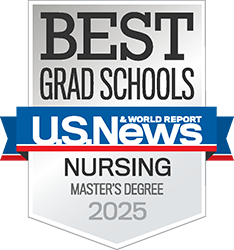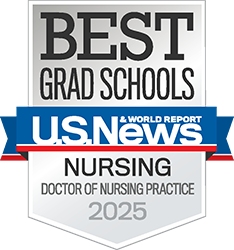Clinicals during COVID-19 Familiarity breeds confidence in dedicated educational unit

A group of Cizik School of Nursing at UTHealth students learned more than technical skills during their clinical rotation at Memorial Hermann-Texas Medical Center (TMC) during the fall 2020 semester – they learned the importance of getting to know patients.
The cohort helped pilot a new dedicated educational unit (DEU) at the hospital designed to enable students to gain the vital patient-care experience needed to complete their coursework while taking some burden off hospital nurses in the midst of the pandemic. Together, the nursing school and the hospital designated a unit where 16 students completed the clinical hours needed for two courses during 10, 12-hour shifts. The unit served elderly patients on one side and cancer patients on the other, none of whom suffered from COVID-19.
The setup earned positive reviews from students, staff nurses, and clinical faculty.
“We have been testing a modified DEU with the instructor on the unit throughout the shift,” explained Jennifer Ebel, MSN, RN. She served as the instructor for eight students who worked Wednesdays and Thursdays, with Paige Owen, MSN, RN, working with another eight on Mondays and Tuesdays.
Typically, students completing clinical rotations work all over the hospital. If an opportunity arises to learn or practice a specific health care task or procedure, the instructor might not be able to connect with the student in time to teach or observe. Having all of the students and the instructor working full shifts on the same unit made the process more efficient.
“We were all on the same floor, and she didn’t have to go to other floors and units,” said student Allison Hargraves.
The pilot gave students the opportunity to complete clinical requirements for their Care 2 and high-acuity rotations in a five-week period. Since they worked on the same unit throughout, they more quickly became familiar with their environment – and all parties became comfortable with one another.
“I’ve never been in any unit that was more student-friendly and actively sought out learning opportunities for the students,” Owen said.
“At Memorial Hermann, I haven’t met one nurse who hasn’t been willing to work with us and teach us,” agreed Joseph Boyle, then-president of the Cizik School of Nursing Student Government Organization.
A special patient
One of Ebel’s cohort groups learned some important lessons from a patient they met their first day at the hospital.
The four Pacesetter BSN students constitute quite a diverse group. Boyle is a former Army medic and civilian paramedic, Jared Matheson left a career as a lawyer to become a nurse, Hargraves commutes from the small town of Anahuac, and Jonathan Luczon is a 19-year-old who completed many of his nursing prerequisites through Lone Star College while still attending Klein Oak High School in Spring.
Their first day on the unit was devoted mostly to getting oriented and practicing skills. But all four gravitated toward one younger patient.
“He was in such severe pain, but he was able to maintain composure and converse with us,” Luczon said. “It was so inspiring.”
Boyle put his military scrounging skills to work to find supplies the patient needed and shared stories of overseas travel. All four sat with the patient at different times when they weren’t working on other tasks.
“Instead of just focusing on the symptoms, we talked with him and got to know him as a person,” Matheson said. “His family couldn’t be there with him, so we were being his friends and distracting him.”
Matheson, Boyle, and Luczon were glad to run into the patient at a restaurant after his discharge. The young man and his family expressed gratitude for the compassion the four students showed their first DEU patient.
“The experience on the DEU gave us a lot more confidence in our skills and with being able to communicate with patients,” Luczon said. “It’s a fundamental skill that you can’t develop in on-line simulations.”
The future of DEU
“We are really proud of the program,” said Rosemary Pine, PhD, RN, director of hospital education and professional development at Memorial Hermann-TMC. “Everyone involved had good things to say about the experience.”
The DEU model not only gave students more time to get to know patients, it also allowed the Memorial Hermann nurses to get to know the students and become more comfortable with assigning them tasks. Some days, the students were able to pick up the slack when the unit was short on technicians.
“I told the students my goal at the end was to make them feel like new graduates,” Owen said. “By their ninth or tenth rotation, they told me they did feel like new grads, and the staff started treating them that way.”
Instructors and students alike recommend the DEU experience.
“It has been such a dream,” Ebel added. “First off, we were always on the same unit so I always knew where my students were. We knew the kinds of patients we would have, and the staff knew us as well. I think they know some of the strengths and weaknesses of our students better than I do.”
“We are all very thankful to have the opportunity to do this because getting into the clinicals was a competitive process,” Matheson said. “I hope students in the future can have this opportunity.”
After Dr. Pine assessed evaluations of the DEU pilot with Cizik School of Nursing Associate Dean and Undergraduate Department Chair Erica Yu, PhD, RN, the decision was made to continue the successful program in the spring 2021 semester.
“We expect to continue with TMC and hopefully at other Memorial Hermann system hospitals as well,” Dr. Yu said.
Sherri Deatherage Green



